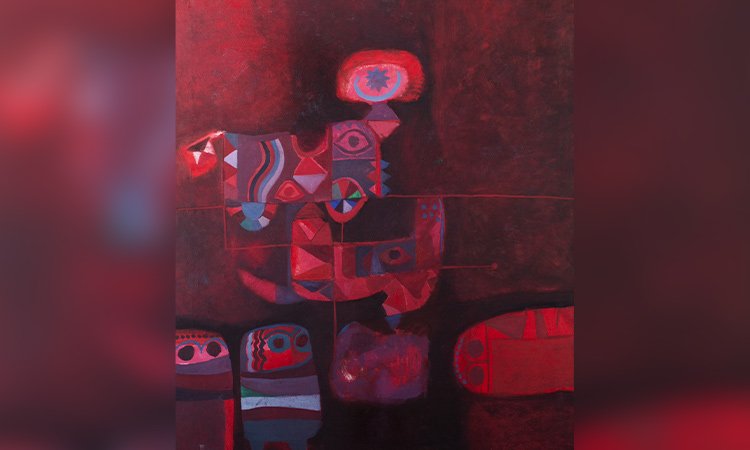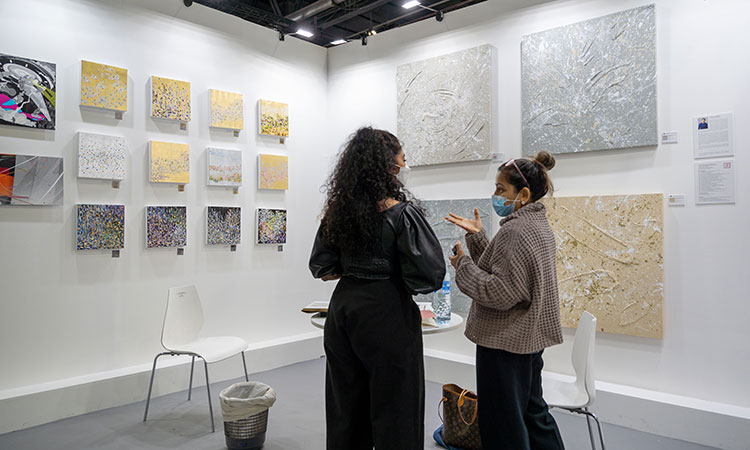MOSAIKON conservation course ends in Lebanon with a mosaic of activities

An ancient mosaic work reveals its secrets.
Muhammad Yusuf, Features Writer
The Directorate General of Antiquities of Lebanon (DGA), Getty Conservation Institute (GCI) and the International Centre for the Study of the Preservation and Restoration of Cultural Property (ICCROM) through its Sharjah Regional Office, have announced the conclusion of a four-week course in Sidon, Lebanon, focused on the conservation of mosaics in storage.
The “MOSAIKON Training Worksite for the Conservation of Mosaics in Storage” took place Oct. 10 — Nov. 4. MOSAIKON is a 14-year initiative in collaboration with the GCI, the Getty Foundation, ICCROM, and the International Committee for the Conservation of Mosaics (ICCM). Since 2008, MOSAIKON has trained over 200 individuals in mosaic conservation from countries of the southern and eastern Mediterranean region.
The course included a lecture by a coordinator of MOSAIKON, Dr. Aicha ben Abed, who spoke on the history of mosaics in the Mediterranean basin, explaining their importance, types, and forms. Architect Sarkis El Khoury, Director General of Antiquities in Lebanon, and Dr. Zaki Aslan, Regional Representative of ICCROM for the Arab States and Director of the ICCROM-Sharjah Office in the UAE, in the presence of Livia Alberti and Cristina Caldi from the GCI, visited the training site, viewed the mosaic fragments that were stabilised and rebacked and the storage structure that was maintained.

“The fragile conservation state of the mosaics in Sidon storage led us to develop simple, inexpensive, and sustainable treatment methodologies for their long-term storage in accordance with Lebanon’s needs,” said El Khoury. “For over a decade, ICCROM has had the privilege of working with committed partners and outstanding participants of the MOSAIKON initiative," said Webber Ndoro, ICCROM Director-General.
"We are pleased to see this continue as we cultivate future leaders in efforts to conserve mosaic heritage.” Threats to mosaic conservation include new construction, looting, and a lack of trained professionals for managing ongoing maintenance needs. The course convened eight DGA employees and two government employees from Jordan to enhance the capacity of authorities in these countries to conserve their mosaic heritage. Trainees learned through practical experience a different methodology for documenting and conserving lifted mosaics using lime mortars to stabilise and re-back them, along with preventive measures to store them long-term.
“It was an honour to hold this course in Lebanon, one of the first countries where we originally began the MOSAIKON initiative,” said Thomas Roby, senior project specialist at GCI. Practical exercises were conducted with participants using examples from a large collection of lifted mosaics from downtown Beirut that have been stored in Sidon without any backing since 1998.
After assessing their poor conditions, the urgent work to provide mortar backings and remove the deteriorated facings used to lift them decades earlier, was carried out on one mosaic fragment.The supervised operations by the trainees ended with the fragment being moved to a prototype metal storage shelving unit for its long-term survival.
“We are honoured to have been ICCROM’s focal point for the MOSAIKON initiative since its inception with committed partners in 2008; it’s fulfilling to culminate a decade of work with Mediterranean countries addressing an often-neglected hidden areas of storage with significant mosaics, such as the ones uncovered in Central Beirut in 1990s,” said Dr. Aslan. While the completion of the Sidon course is among the final MOSAIKON activities, partners in the initiative will continue commitments to its long-term goal of preserving ancient mosaics throughout the Mediterranean basin.
Another MOSAIKON course for lifted mosaics will take place in Byblos, Lebanon, in late November, by the Lebanon Ministry of Culture - Directorate General of Antiquities (DGA). Getty is a leading global arts organisation committed to the exhibition, conservation and understanding of the world’s artistic and cultural heritage. Working collaboratively with partners around the globe, the Getty Foundation, Getty Conservation Institute, Getty Museum and Getty Research Institute are all dedicated to the greater understanding of the relationships between the world’s many cultures.
The Los Angeles-based J. Paul Getty Trust and Getty programmes share art, knowledge, and resources online at Getty.edu and welcome the public for free at the Getty Center and the Getty Villa. GCI works internationally to advance conservation practice in the visual arts — broadly interpreted to include objects, collections, architecture, and sites. The Institute serves the conservation community through scientific research, education and training, field projects, and the dissemination of information.
The Getty Foundation fulfills the philanthropic mission of the Getty Trust by supporting individuals and institutions committed to advancing the greater understanding and preservation of the visual arts in Los Angeles and throughout the world. It promotes interdisciplinary practice of conservation, increases access to museum and archival collections, and develops current and future leaders in the visual arts.
ICCROM is an intergovernmental organisation, headquartered in Rome, working in service to its Member States to promote the conservation of all forms of cultural heritage in all regions of the world. ICCROM-Sharjah is a regional conservation centre founded by ICCROM and the Government of the Emirate of Sharjah, where it has been based since its inception in 2012.
ICCROM-Sharjah is a continuation of ICCROM’s ATHAR programme, launched in 2004, which dedicates its activities to the protection of cultural heritage in the Arab region and to broadening access, appreciation and understanding of its rich history. DGA is a governmental department, under Lebanon’s Ministry of Culture, since 1993. It encourages and supports cultural organisations and creative arts in all their forms.







